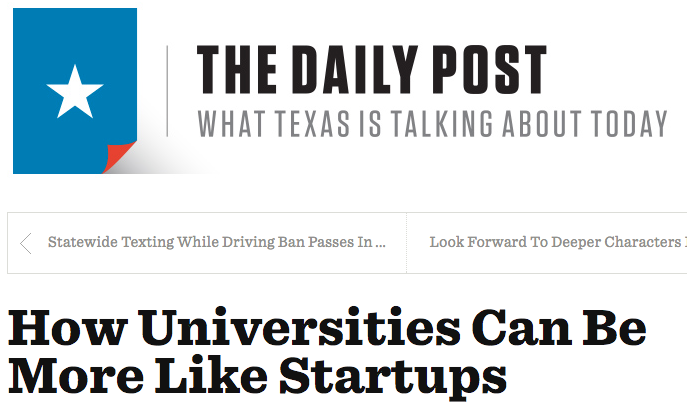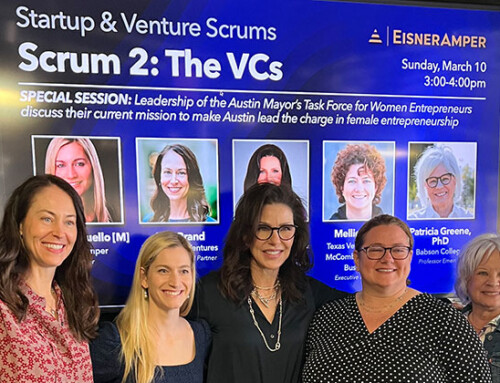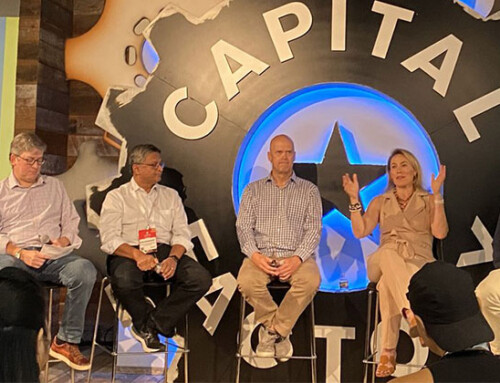This article originally appeared in Texas Monthly.
University of Texas at Austin President Greg Fenves and the school’s Director of Innovation Bob Metcalfe are launching a startup. Sort of. They’re not decamping to Silicon Valley or anything, but at their SXSW interactive session, “Research Universities Should be Better at Startups,” the UT leaders laid out their ideas about how the culture of innovation can fold into college campuses.
Both Fenves and Metcalfe have extensive engineering backgrounds. Fenves has received a bachelor’s degree in engineering from Cornell University, a master’s degree and a Ph.D from the University of California, Berkeley, and began his career at UT Austin as the dean of the Cockrell School of Engineering in 2008. Metcalfe is an electrical engineer who co-invented ethernet and created Metcalfe’s Law. Their background in fostering breakthroughs informs their perspectives on the benefits of encouraging university startups, but they have differing ideas on how to establish that environment on campuses.
According to Fenves, research universities such as UT Austin have two major roles: educating students and research. The most efficient ways to get that knowledge out into society, according to Fenves, is through startups. Metcalfe took it a step further, adding innovation as a third integral role, and agreed that startups are the ways to implement those goals.
A startup is something that you can wrap around education and research in order to gather and present information, Metcalfe said. But for that to happen universities will have to do better about handling startups that begin on campus. In Metcalfe’s view, all too often on-campus startups are prevented from growing because “immediately all the antibodies in the university descends on the professor to ensure that it’s not a conflict of interest.” That fear can cripple startups before they’ve had a chance to gain their footing. Instead, research universities should alter their culture to be more supportive of startups, “so that when a university produces a startup, it’s not a conflict of interest, it’s their mission,” Metcalfe said.
Recruiting innovation-minded faculty is one way to create a healthy campus startup culture. But another, perhaps trickier question, is figuring out how to handle intellectual property rights. Often times, students and faculty are using university equipment and resources in their projects. The current guidance for how to handle intellectual property rights in those situations is the 1980 Bayh-Dole Act, otherwise known as the Patent and Trademark Law Amendments Act. The act determined that ownership of inventions created using federal funding would belong to the university. Before that, ownership belonged to the federal government, but Metcalfe wondered if the act should have gone further and given ownership directly to inventors.
Fenves said that universities should retain ownership of inventions, but should be “as flexible as possible” when it comes to handling licenses and royalties with investors. That applies specifically for faculty inventors. Each university has different policies and approaches to how they handle intellectual property, and Fenves said that UT Austin recently changed its policy regarding student inventors so that students automatically own their intellectual property, largely because they pay tuition.
Even the very nature of startups complicates the issue of creating a campus culture conducive to them. “When is a startup born?” Metcalfe asked, when asked about how long a startup should be allowed to stay on campus. Citing the University of Cambridge as an example, Metcalfe said the college deans should be given management of any startups that start in their schools. This way, individual schools are able to find their own balance so that startups don’t lose resources too soon, but also aren’t “coddled” on campus.
Successful companies have come out of UT in the past—Dell and National Instruments, for example—but Fenves and Metcalfe say there’s potential for more innovations that can provide solutions to both campus issues and across industries. UT Austin has been holding campus-wide talks around a variety of “big problems” that faculty and students want to see addressed, Fenves said. During those conversations, Fenves says there have even been interesting ideas on how technology can address issues like equity on campus.
As UT Austin grapples with how to establish an ideal startup culture, both Metcalfe and Fenves note that they’re lucky to have the Austin startup community as a nearby resource for experience and guidance. With that surrounding environment and the level of education happening at UT Austin, there’s potential for campus startups to create innovations that won’t just benefit industries, but that could also directly benefit the Austin community. Still, Metcalfe and Fenves have standards as to what that means. An important factor, Metcalfe said, is for innovators not to pursue “unworthy goals” such as “finding your date on Sixth Street using an app.”






